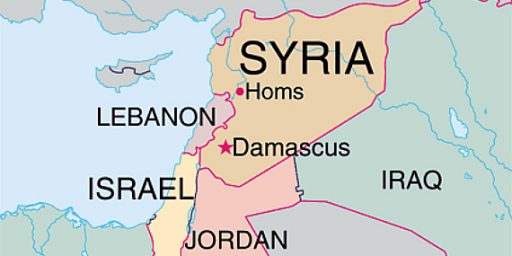Workers Abducted Outside Iraq Factory
A large number of Iraqi workers were kidnapped as they were leaving their factory jobs earlier today.
Scores of Iraqi workers were abducted Wednesday as they left an industrial plant north of Baghdad, police said. The number kidnapped was unclear, but police Lt. Thaer Mahmoud said they filled up a bus and a minivan. The workers were seized at the al-Nasr General Complex in Taji, 12 miles north of Baghdad. Under Saddam Hussein, the complex was a military plant.
It was the most recent case involving mass abductions. On June 6, gunmen in police uniforms raided a business district in central Baghdad, seizing 50 people, including travelers, merchants and vendors. Both Shiites and Sunnis work in the area. The Shiite-dominated Interior Ministry, which oversees police, denied its forces were behind the kidnappings.
Quite bizarre. One would think detonating a bomb to kill the workers would be both more effective and lower risk for the perpetrators. I suppose they need to continue coming up with new variations so that people don’t get blasé.






Maybe so it’s they can sort through and kill just the Sunnis/Shiites. Or just the guys named Omar.
Obviously, they were all illegal immigrant workers being rounded up by the Iraqi Minutemen!
Or not.
Isn’t this just another example of the progress we are making– the insurgents are now able to operate at this level versus placing a few IEDs
a couple of years ago.
Obviously the press is to blame because they did not report on enough school openings.
Does stay the course means that we only lose the war slowly while Bush waits to hand over the mess he created to the next president?
If the papers found in Zarqawi’s crater (former hideout) are authentic, then this may be representative of the fact that his group if finding it harder to recruit suicide bombers, Placing an unmanned bomb outside the factory probably would have been too easily found.
Or, maybe James is right and they’re just trying a different tactic. Kidnappings combine the fear or sudden unpredictable violence with a long agonizing fear for the families of those kidnapped. However he’s right about it being higher risk, if one of those kidnapped has a cellphone that isn’t taken away, their location could be found pretty quickly.
Alas, I fear they believe they need to make some more videos.
This isn’t about sending a message to America, or to George Bush. This is about sending a message to other Iraqis. Killing them with a bomb, as in the past around police stations, won’t have the same effect as this, especially on such a large scale.
The Iraqi people are caught between a rock and a hard place, in much the same way many South Vietnamese villages were in the later part of that war… Cooperate with the VC/insurgents, and the Army will burn down your village. Cooperate with the US and your family will die. They’re screwed no matter what.
Notwithstanding Legion’s subsequent Vietnam reference (worthy of a Godwin corollary by now, I’m sure) this…
…is the only explanation that makes sense.
Thanks McG, but I too am not fond of comparing Iraq to Vietnam (or war x to war y for that matter; I find it largely useless). I was only comparing the problems of the civilians caught ‘in the middle’ in each – I don’t recall similar situations in earlier conflicts.